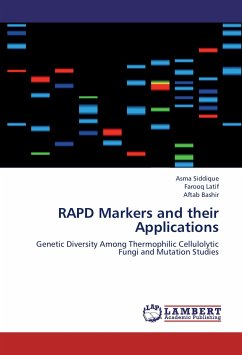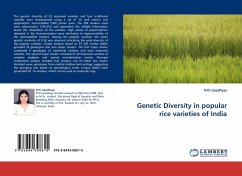Recent developments in DNA marker technologies have made it possible to uncover a large number of genetic polymorphisms at the DNA sequence level, and to use them as markers for evaluation of the genetic basis for the observed phenotypic variability. The molecular markers possess unique genetic properties and methodological advantages that make them more useful and amenable for genetic analysis compared to other genetic markers The commonly used techniques are allozyme analysis, RFLP, RAPD, AFLP, microsatellite typing, SNP and EST markers, etc. In present book, three DNA markers i.e. microsatellite, mitochondrial DNA and SNPs, along with their application in assessments of genetic variability and inbreeding, parentage assignment, species and strain identification, hybridization and marker assisted selection are discussed in detail.
Bitte wählen Sie Ihr Anliegen aus.
Rechnungen
Retourenschein anfordern
Bestellstatus
Storno








